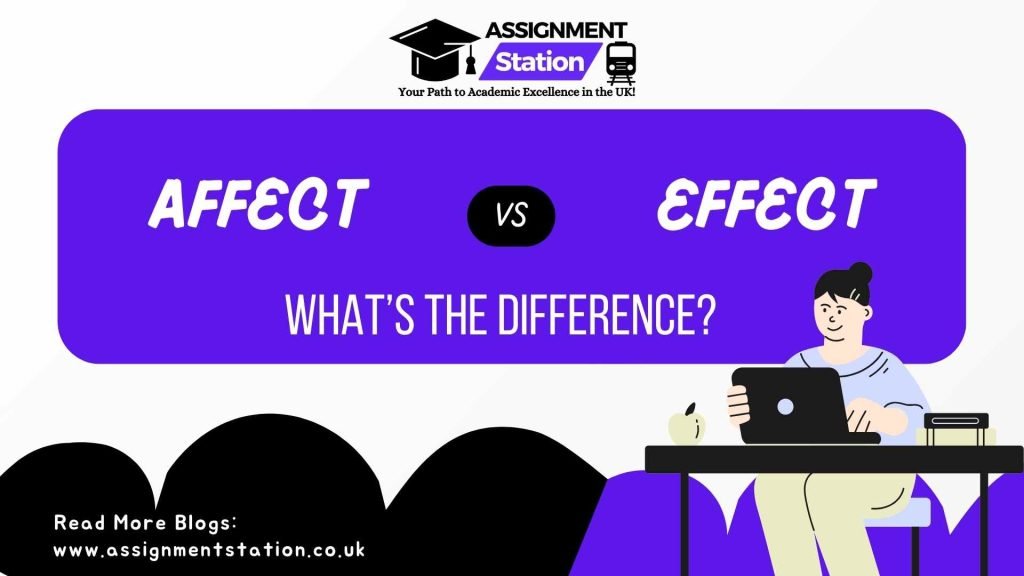When it comes to writing, one of the most common sources of confusion is the use of “affect vs effect.” These words sound similar, and their meanings are related, but they serve different grammatical purposes. Knowing how to use them correctly can make a significant difference in your writing quality, whether you’re working on an essay or seeking help from essay writing services.
This blog will explain the key differences between “affect” and “effect,” provide examples, and offer tips to help you always choose the right word.
Affect vs. Effect: The Basic Difference
In basic terms, “affect” generally functions as a verb, whereas “effect” is most often used as a noun.
- Affect means “to influence” or “to make a difference.” It’s an action word, so you’ll use it when something is causing change.
- Effect” denotes the outcome or result that arises from a change, describing the impact or consequence of an action.
For example:
- The rain affects the crops (action).
- The effect of the rain is that the crops grow faster (result).
When to Use “Affect”
As a verb, “affect” signifies the act of causing a change or influence in something.
Examples of “Affect” in Sentences:
- The new policy will affect thousands of employees.
- Climate change is affecting global weather patterns.
- Winning the competition positively affected her confidence.
In each of these examples, “affect” is used to show how one thing influences another. It’s important to remember that affect is generally an action word.
Here’s a useful tip: Think of Affect with an “A” for Action. Since verbs express actions, this can help you recall that affect is a verb.
When to Use “Effect”
Examples of “Effect” in Sentences:
- The new legislation significantly impacted the economy.
- The medication’s impact will persist for four hours.
- Tina’s speech had a motivating effect on the entire team.
In both instances, “effect” refers to the result or consequence of a specific action or event. A helpful mnemonic: “Cause and Effect” both end with an “E.” This can remind you that effect is the result of a cause.
Common Mistakes with Affect vs. Effect
Because affect and effect sound so similar, they’re often confused, especially in spoken English. However, in written English, using the wrong word can change the meaning of your sentence entirely, making it essential to use them correctly.
For example:
- Incorrect: The storm had a major affect on the village.
- Correct: The storm had a major effect on the village.
In this case, the storm caused a result, which is why effect is the correct word.
Exceptions to the Rule: When Affect is a Noun and Effect is a Verb
While “affect” is generally used as a verb and “effect” as a noun, there are rare cases where “effect” can act as a verb to mean “to bring about.”
- Affect as a Noun: In psychological terms, “affect” describes the visible display of emotions. For example:
- The patient had a flat affect throughout the session.
- Effect” used as a verb means to bring about or initiate a change.
- The new manager wanted to effect significant changes in the company.
This usage of effect is less common, but it’s important to recognize it in contexts where change or outcomes are actively being brought about.
Affect vs. Effect in Academic Writing
In academic writing, especially when using essay writing services or receiving essay help, you’ll often need to choose between affect and effect. Knowing which to use will improve the clarity and professionalism of your work.
In scientific essays, you could write something like this:
- Affect: “The drug significantly affected the patient’s recovery rate.”
- Effect: “The effect of the treatment was a quicker recovery period.”
Both sentences use the words in their proper contexts—affect for the action and effect for the outcome.
Synonyms for Affect and Effect
Understanding synonyms can also help clarify how to use these words.
- Affect (as a verb) can be replaced with: influence, alter, modify, or change.
- The noun “effect” can be replaced with synonyms such as result, outcome, consequence, or impact.
Using these synonyms in your writing can help diversify your vocabulary while keeping your meaning clear.
Conclusion: Mastering Affect and Effect
Understanding the difference between affect and effect is essential for clear and precise writing. To summarize:
- Affect is a verb, meaning “to influence.”
- Effect is a noun, meaning “the result.”
- Rarely, affect can be a noun in psychology, and effect can be a verb meaning “to bring about.”
By following these guidelines, you can avoid common mistakes and ensure that your writing is both professional and impactful. Whether you’re writing an essay or using resources like essay writing services and Assignment Station, mastering the difference between these two words will help you produce clearer, more effective work.




